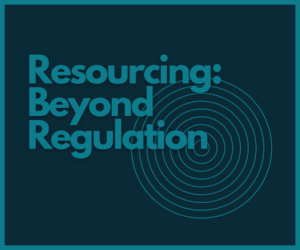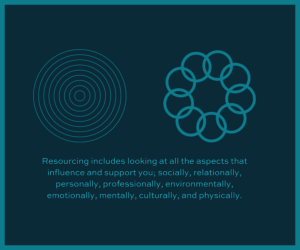
I don’t use the term regulation very much anymore when I discuss emotions or nervous systems support. Like many people, initially, I found the idea of nervous system regulation to be very helpful; it provided me with agency around my trauma symptoms. I discovered that there were other ways of being and that I, at times, could influence them.
So, why did I stop using the term regulation? Regulation in this mental health and somatics climate is focused on the individual. It has a flavour of ‘just get yourself regulated enough, and you’ll be able to endure.’ It seems to perpetuate the idea that there is an ideal state, and within that state, there’s an ideal way to conduct yourself. Read calmly with a side of low emotionality. Initially, there may have been a different intention behind the concept of regulation, but this is how I see it being internalized by most people.
Regulation, particularly self-regulation with a hyper-focus on the window of tolerance, can lead to people bypassing their emotions, movements, and expressions because they believe they should be managed. The result can replicate symptoms of trauma.
When folks regularly experience harm and oppression, asking them to regulate their nervous system and emotions can be akin to gaslighting their lived experiences.
Re-sourcing
I am more inclined to use the concept of resourcing now. How is resourcing different?
- Resourcing is more relational and broadens the lens through which you view your experiences.
- Resourcing considers your capacity as influenced by the systems you move in.
- Resourcing looks at how you are supported and how you are not.
- Resourcing prioritizes your relationship with nature, animals, and the unseen.

When you engage in re-sourcing, the inquiry is, “Do I have the necessary resources to navigate what I am experiencing?” The context includes looking at aspects that influence and support you; socially, relationally, personally, professionally, environmentally, emotionally, mentally, culturally, and physically. It’s a much more fluid and dynamic perspective.
Instead of changing your state, you consider what sources you are connected to and what sources you are disconnected from. It’s a more holistic approach that considers your relationship to and experiences within community, nature, and yourself.
Resourcing doesn’t have an ideal state attached to it; it’s rather a moving target that considers all the variables in your life on the micro and macro levels. This perspective offers acceptance of where you are and how you need to move through life. Angry, messy, chaotic, blissful, calm, confused. You get to be yourself without feeling like you need to manage your experiences; you, instead, get to rest or rage in sources of support.
